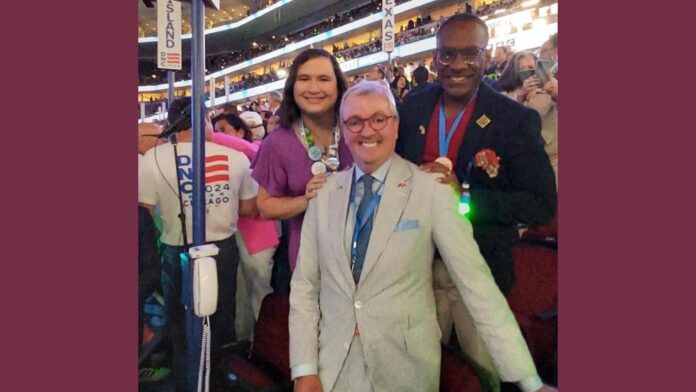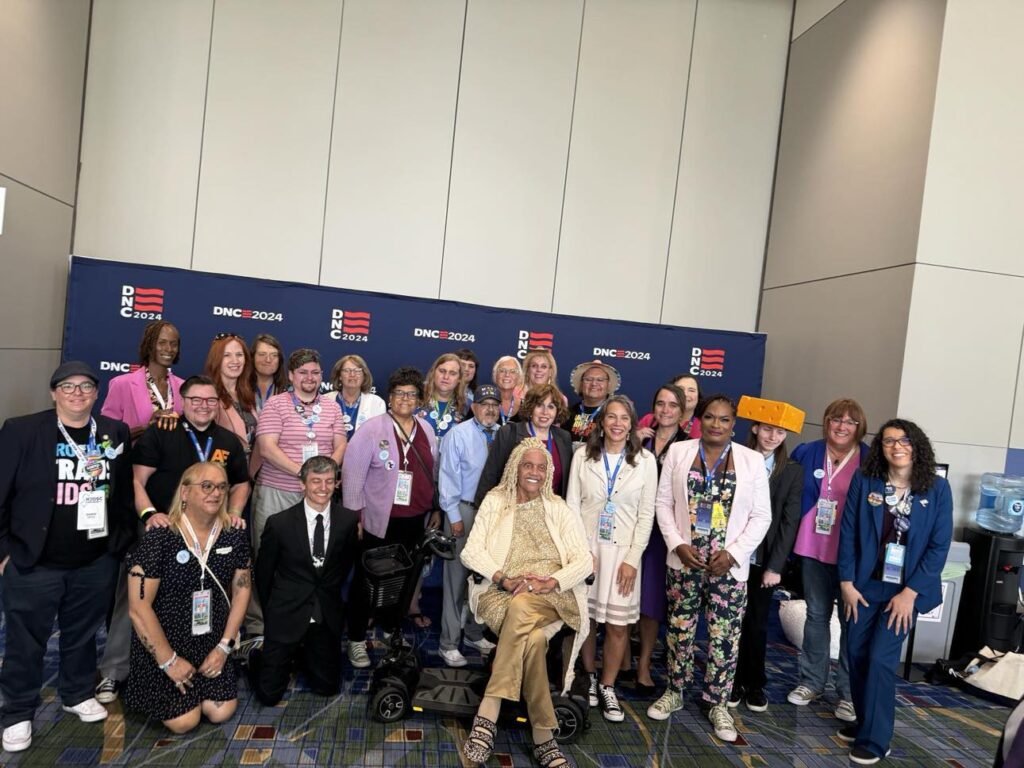
“We’re from Jersey, baby. And you’re not!” said New Jersey Gov. Phil Murphy from the floor of the Democratic National Convention before turning to one of the state’s delegates. “In the great Garden State, we care about protecting women’s rights and lifting up vulnerable communities. That’s what we mean when we say the great Garden State.”
He handed the mic to Dr. Joeigh Perrella, a trans woman who lives in Vineland and isn’t a full-time politician or activist. She’s a dentist. The crowd exploded in cheers as she introduced herself and shared why she supports the Harris/Walz ticket.
“I’m a proud resident of the Garden State,” she said. “I’m proud to stand with Kamala Harris and Tim Walz because they stand with the LGBTQ community. It’s time to turn the page on Trump!”
New Jersey Democratic State Committee Chairperson LeRoy J. Jones Jr. then cast 144 of New Jersey’s votes to the Harris/Walz ticket.
The movement to vote as “uncommitted” was also represented by New Jersey. Because the “uncommitted” vote received more than 15% of the votes in two delegate districts, two of New Jersey’s votes were counted as “present” rather than awarded to a candidate.
Perrella said her statement wasn’t a sure thing until just moments before she spoke. State party leaders had initially asked her to speak — but when each group was later told to condense speakers in order to keep the program on time for network television, she was cut.
When Murphy noticed that other state leaders weren’t abiding by the change in plans, he decided to go rogue himself.
“As I’m sitting there, the governor of New Jersey — Gov. Murphy, he kind of turns back at me, and he’s like, ‘If you’re so comfortable speaking, I’m putting you back in the schedule. Are you good to go?’”
Perrella’s decision to make a statement fulfills a hope that started when she was ten years old — back when she was just a political science nerd tuning into the convention on C SPAN, dreaming of participating as a delegate one day.
“That dream finally came this year and it was outside my wildest expectations or hopes,” she said, noting how special it was to be able to address the convention during the roll call. “To stand and represent not just the people of New Jersey but also the queer community was the honor of a lifetime — a memory I’m never gonna forget, and it was almost like this out-of-body experience.”
It wasn’t until after the event when she watched a recording that she truly felt the power of crowd’s applause as she spoke.
“That acceptance, that affirmation — when a lot of times in our community, we have to sort of fight to be seen for who we are — to be given that without any reservations or questions or doubt is such a beautiful thing,” Perrella added about the experience of listening to thousands of people around her burst into cheers. “It’s something that I wish everybody in our community could experience.
Trans and nonbinary people were notably absent from mainstage programming and trans-specific issues were not mentioned in many speeches. Still, Perrella was one of over 800 LGBTQ+ delegates to participate — including over 50 trans and nonbinary delegates, the largest number of openly trans and nonbinary participants in the history of the convention.

Perrella is keeping in touch with other trans and nonbinary leaders she met at the convention and is already planning trips to volunteer for the campaign trail on behalf of those who are running for local office in their own states.
Although Perrella has been active in the Democratic party since she turned 18 — volunteering on campaigns, helping out on election day, phone banking, canvassing, and participating in other events — she said she decided to do even more following Trump’s 2016 win.
“We kind of went into 2016 feeling really confident and like we were going to make history,” she said about supporting Hillary Clinton that year. “These wonderful things were going to happen, and all these opportunities were going to start to open up, and we were going to really see some progression in our society — then Trump happened, and it was a gut punch.”
When she transitioned a few years ago, she felt forced to become a stronger advocate for the LGBTQ+ community — especially in the face of anti-trans movements across the United States. She decided to start showing up at local schools when discussions about policies regarding trans students took place.
“I just became more vocal, speaking out at the school board meetings and making sure that there were adult voices in the room standing up for these students,” she said about being an ally to LGBTQ+ youth.
She expects the same from political leaders — that they do what it takes to show up for LGBTQ+ people even when they’re not personally impacted by policies and stances.
“One of the things that I talk about in activism work is the importance of allies — and that allyship isn’t just supporting and encouraging people in the LGBTQ+ community as we work for our rights. But it’s actually jumping into that fight with us and helping us and taking those actions along with us,” she said. “To me, that speaks so much louder than any type of promises or campaign speeches they may make as candidates.”
“I think the energy is sky-high right now,” she added about witnessing people who were previously disengaged get excited about supporting the Harris/Walz ticket — candidates who “don’t just say that they want to support the LGBTQ+ community but have actually continuously done that throughout their careers.”
